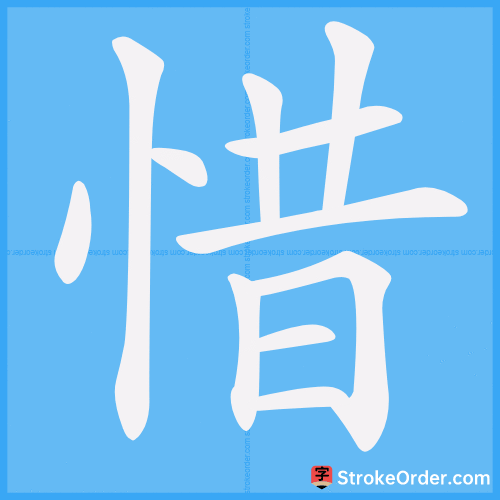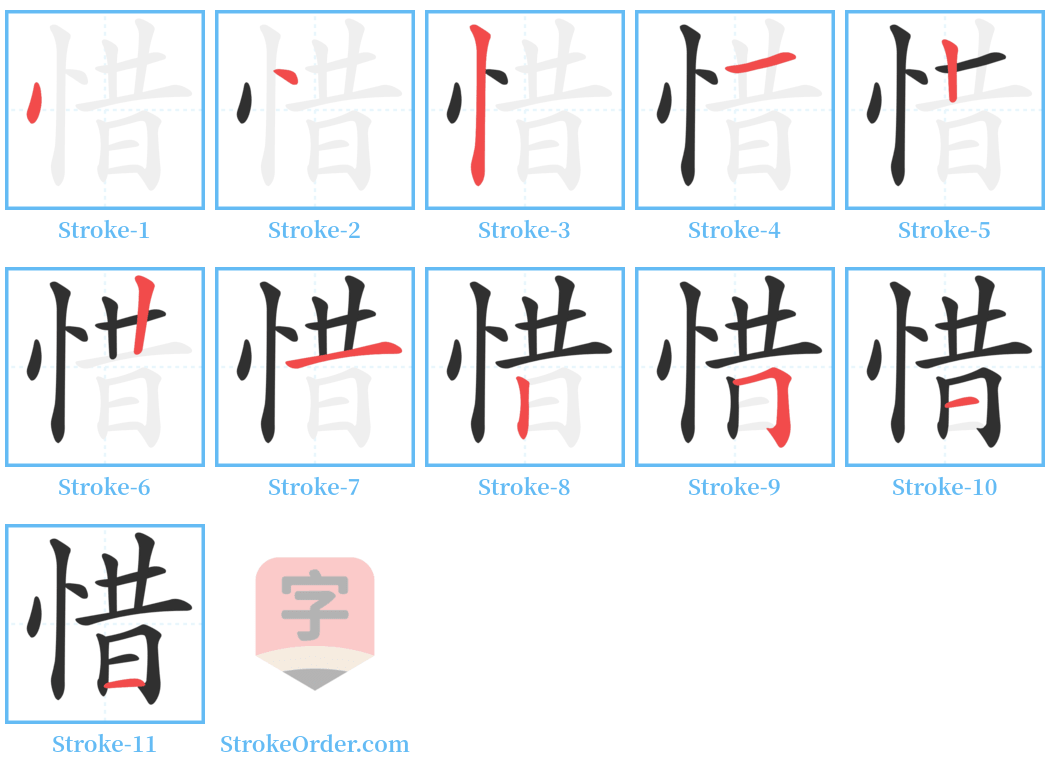惜 Stroke Order
Animated Stroke Order of 惜

Stroke Order Diagrams for 惜

Step-by-Step Handwriting Guide for 惜

Learn to Write Chinese Characters with Video Tutorials
Watch the video of writing the Chinese character "惜", learn the correct stroke order (笔顺) of the character "惜", and master the standard way of writing the character "惜".
Free Printable Handwriting Practice with Stroke Order: 惜
Printable Writing Practice Worksheet of "惜" in Portrait Orientation (Tian Zi Ge)

Printable Writing Practice Worksheet of "惜" in Landscape Orientation (Tian Zi Ge)

Information of 惜
Pinyin
xī
Radical
忄
Strokes
11 strokes
Usage
★★★★★
Definition
pity, regret, rue, begrudge
惜 [xī]
(verb)
1. Love, value; to hold dear.
Example: 爱惜 (to cherish);重惜 (to treasure)
2. Reluctance; to be unwilling to part with.
Example: 吝惜 (to be stingy);惜别 (reluctant to part)
3. To feel regret or sorrow; to mourn.
Example: 可惜 (it's a pity);惋惜 (to regret)
本义: 哀痛,哀伤 (Original meaning: sorrow, grief)
造字法: 形声。从心,昔声。 (Character formation: phonetic-logographic; composed of “heart” and “past” components)
同本义: be deep sorrow; be grieved.
Cherish, value, emphasize, and not waste or squander.
Feel sorry for someone or something; have pity for.
Pity; compassion for others.
Be greedy; have an insatiable desire.
Stingy; reluctant to spend or part with.
引文:
1. 《说文》: 惜,痛也。 (It means pain.)
2. 《楚辞・惜誓序》: 惜者,哀也。 (To lament is to sorrow.)
3. 汉·贾谊《论积贮疏》: 为陛下惜之。 (To lament for Your Majesty.)
4. 宋·苏洵《六国论》: 惜其用武不终。 (Regret that the military power was not fully realized.)
5. 清·袁枚《黄生借书说》: 岁月为可惜。 (Time is to be cherished.)
例:
可惜 (worth grieving);痛惜 (deeply regret);惜伤 (grief).
珍惜, 爱惜, 重视不糟蹋耗费 (To cherish, to treasure, to value without waste).
Examples:
吝惜 (to be overly frugal);怜惜 (to sympathize);珍惜 (to treasure);惜玉 (to tenderly care for women);惜体面 (to care about one's reputation);惜福 (to be wealthy but not overly indulgent);惜护 (to protect with great care);惜名 (to value one's reputation).
惋惜: feel sorry for someone or something.
Example: 爱惜 (to value deeply, to have sympathy).
哀怜, 哀悯: to feel pity for others; to show compassion.
Examples:
《楚辞・惜誓》: 惜余年老而日衰兮 (Pity as time passes and one ages).
《滕王阁序》: 杨意不逢,抚凌云而自惜 (Regretting one's unfulfilled potential).
贪婪, 贪求: to be avaricious; greedy for; have an insatiable desire for.
Example: 《楚辞・惜诵》: 惜诵以致愍兮 (Pitying the failure to memorize the verses).
吝惜; 舍不得: to be reluctant to part with something.
Examples:
李陵《答苏武书》: 子卿视陵,岂偷生之士,而惜死之人哉 (Are you a coward who values life over the dead?).
唐·白居易《卖炭翁》: 驱将惜不得 (To drive away is to be unwilling to part).
孙文《黄花冈七十二烈士事略序》: 不惜牺牲生命 (Not hesitating to sacrifice one's life).
例:
惜吝 (to be stingy); 不惜工本 (not spare effort); 不惜金玉 (not spare gold or jewels).
*引自繁体辞典解释*
爱的、珍惜的、舍不得的。如: 惜福、吝惜、爱惜、死不足惜、怜香惜玉。
悲痛、哀伤。如: 痛惜。
Input Method for 惜
Pinyin
xi1
Wubi
najg
Cangjie
pta
Zhengma
uek
Four Corner
94061
Unicode
U+60dc
Same Pronunciation Characters